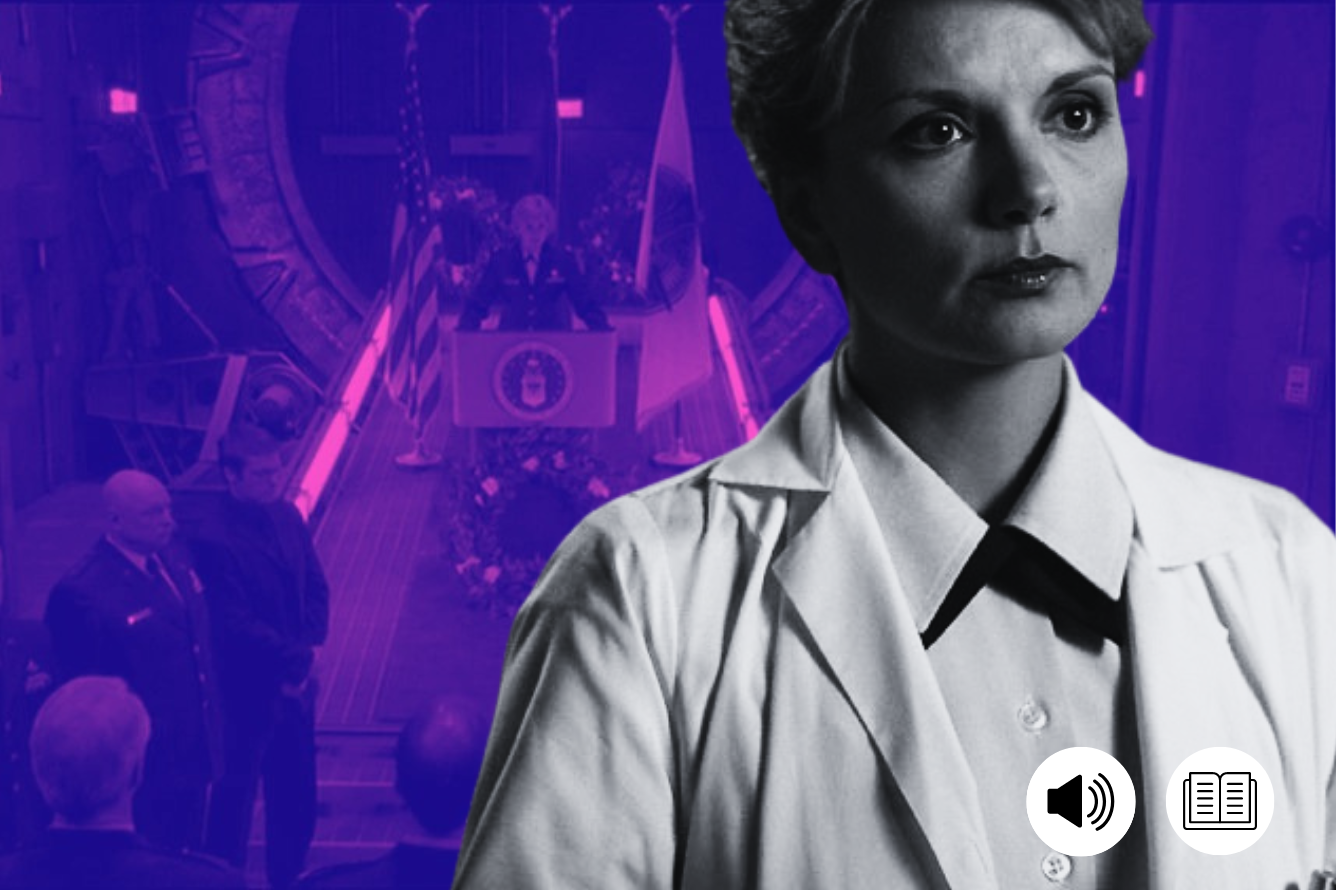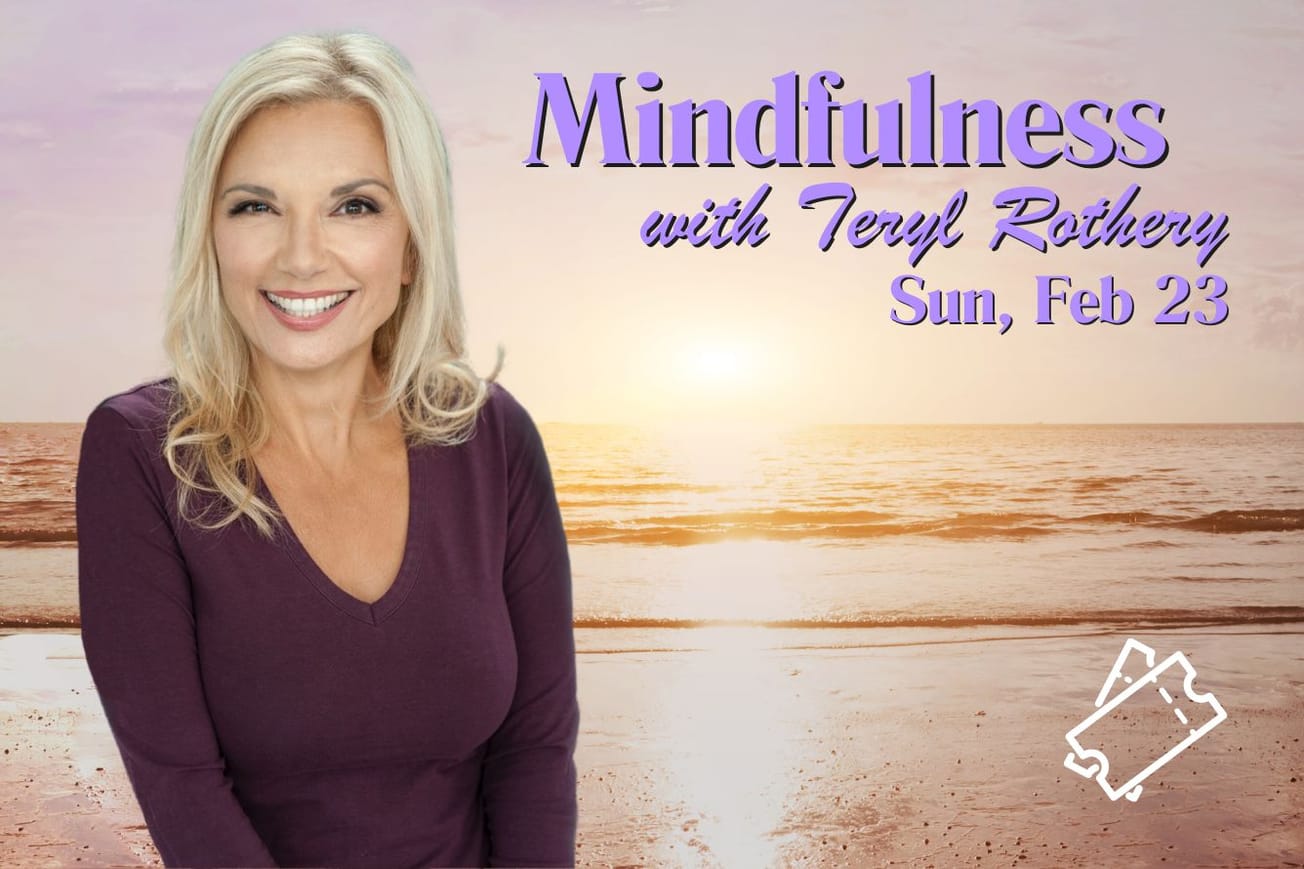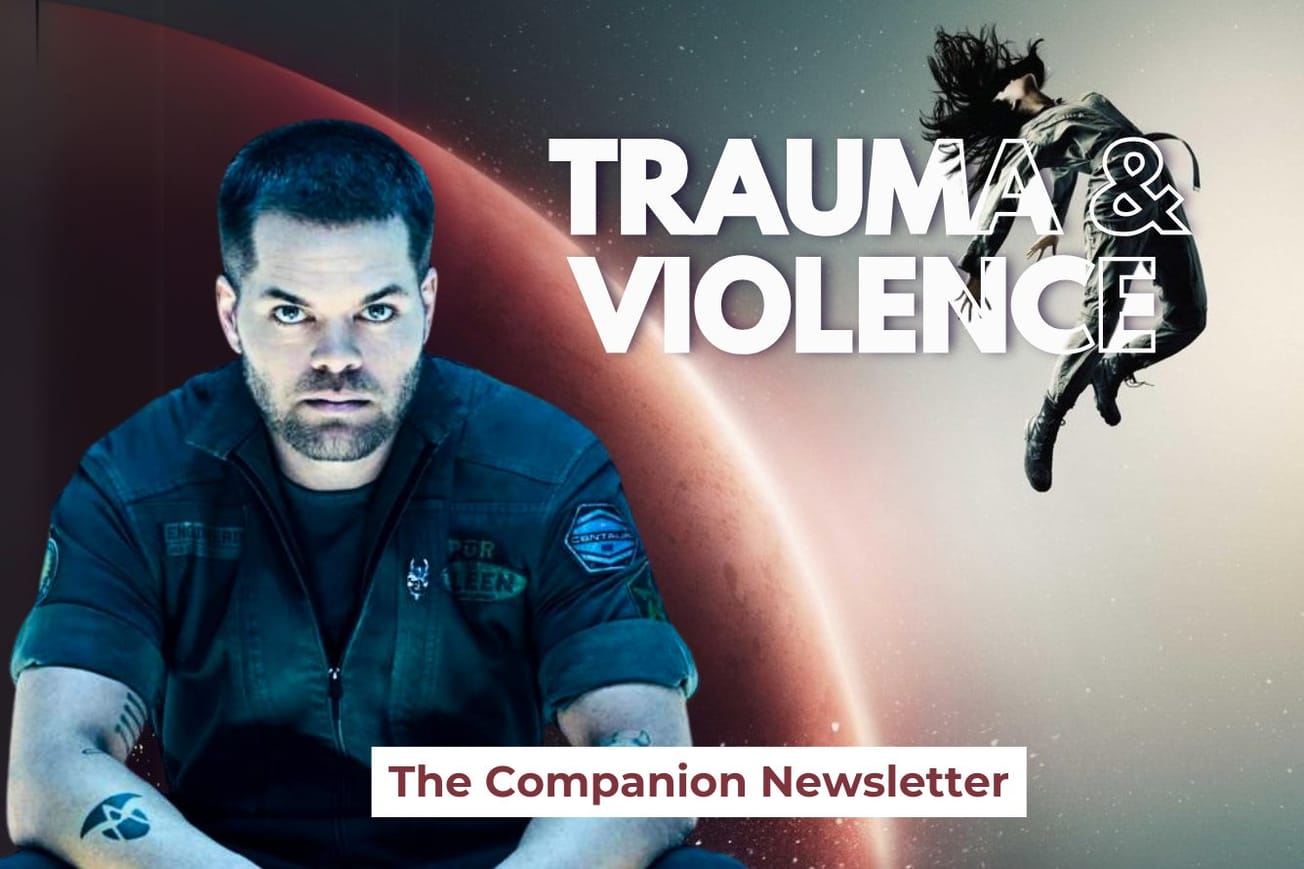You can also listen to Janet’s Death Stings Now More Than Ever on Apple Podcasts, Google Podcasts, Spotify, or RSS Feed.
“War does not determine who is right — only who is left.”
Stargate SG-1 is, on the surface, a beautifully fun and zany romp of a sci-fi series. We have a bevy of suitably wild costumes, usually based on those worn in Ancient Egypt. The villains are campy and fond of heavy eye makeup. There is, too, a bevy of new oxygen-rich worlds for our plucky heroes to explore – usually with suspiciously North American-esque landscapes, true, but sometimes strewn all over with fairy lights and strange flora and fauna for that oh-so-alien effect. And, on the subject of those aforementioned plucky heroes, we have a core team of warm and quick-witted men and women (fine, woman) – all of whom are seemingly equipped with as many jokes as they are bullets. Or, in the case of Teal’c (Christopher Judge), as many eyebrow raises as he is ma’tok blasts.
That’s only on the surface, however. Because, as diehard fans of Stargate SG-1 will already know all too well, the show’s true story runs far deeper than that. The Gate system allows for a new planet, and a new thought-provoking theme, to be explored in each episode; over the years, we were treated to thoughtful hot takes on everything from politics and flawed prison systems to pandemics (ever relevant in our post-Covid world) and the classic good vs evil divide.

Our heroes may have been plucky, and they may have been able to find the humor in these situations, but they weren’t perfect by any means. Colonel Jack O’Neill (Richard Dean Anderson), still grieving the death of his young son, had a noticeably short temper at times. Major Samantha Carter (Amanda Tapping) was sometimes too stringent in her scientific applications, failing to see the more human answer to a problem in her dogged pursuit of logic. Dr. Daniel Jackson (Michael Shanks)’s unshakeable belief in others’ morality often led him to overestimate their capacity for doing the right thing. And Teal’c? Well. while Teal’c was the very definition of a “gentle giant”, his unshakeable hatred of the Goa’uld often prompted him to “snake bait” and put himself in danger many times over.
War Doesn’t Discriminate
Essentially, the quartet that made up SG-1 was believably fallible – although they always followed a strict moral code and strived to do the “right thing” wherever and whenever they could. And this fallibility, of course, came hand-in-hand with something not unlike simmering darkness. Because this show was, let’s face it, every bit as dark as it was fun; how could it not be? Hidden underneath Cheyenne Mountain, the Stargate program was a top-secret military outlet under the control of the US government.
This meant, for starters, that there was an opportunity for corruption; I’m thinking about the Stargate SG-1 episode ‘Secrets’ (S2, Ep9) in particular, in which a journalist named Armin Selig (Chris Owens) somehow learned about the Stargate Program and relentlessly pursued Colonel O’Neill in his bid to confirm the leak and get the ultimate scoop. The journalist’s story never ran, of course; he was run down by a speeding car in Washington, DC. In his dying moments, he cursed O’Neill for having him killed – and, while Hammond reassured a shaken Jack that nothing sinister had taken place, the show forever implied that Selig’s death was no accident.
It meant, too, that the continued usage of the Stargate didn’t just allow Earth to forge new off-world friendships; it also introduced our planet to new enemies, too. And this, combined with the show’s penchant for deep themes and fallible characters, saw our core heroes constantly thrown into danger at every turn. So much so, actually, that we often worried that, one day, one or all of them would fail to return through the wormhole. That they would be taken prisoner, injured, or – the worst of all – killed in battle.

But war, as the news constantly reminds us at the moment, reaches far further than the front lines. That one doesn’t have to engage in battle to find themselves caught up in it. And this is underlined in Stargate SG-1’s unforgettable two-parter, ‘Heroes’ (S7, Ep17-18), in which one of the show’s most beloved characters is killed during an off-world mission.
It was the sort of death that took everyone watching by surprise. We knew that someone was due to be killed off, sure, and we knew that it would be someone important. We had seen Colonel O’Neill take a staff blast to the torso, after all, and we had seen an unidentified – yet clearly lifeless – body on a gurney back at the base. We, too, had seen a tearful Major Carter struggling to comprehend the tragedy – and we knew all about her unspoken feelings for O’Neill. Plus, there were rumors that Richard Dean Anderson was planning on leaving the show.
It made sense to us, then, that the soldier we’d all fallen in love with during the previous seven seasons had been killed in the line of duty.
Instead, footage accidentally recorded by Dr. Jackson revealed the truth: the ever-dependable Dr. Janet Fraiser (Teryl Rothery) had also gone through the gate that day, medical gear in hand. And she had been fighting to save the life of a wounded soldier when a shot from a Jaffa shuttle hit her squarely, rendering the new protective vest designed by SGC useless to save her.
Dr. Fraiser – our Janet – had died on the spot.
Thinking the Unthinkable
It was the ultimate bait-and-switch by writers because Dr. Fraiser wasn’t someone we expected to be in the line of fire. We never associated her with the horrifying chaos of battle; instead, she had served as the metaphorical embodiment of safety and healing for the best part of a decade. Whenever our heroes had awoken under her care in the past, we knew all would be well, because her reassuring presence had long signified that everything would be okay. And the idea that she wouldn’t be there anymore to welcome SG-1 back through the Gate anymore? It was honestly inconceivable.

As Robert C. Cooper, the episode’s writer told GateWorld: “Any time we talked about killing a character it was obviously a big deal in the room. And in that case, we didn’t do it lightly.”
He added: “To me, it was like you have to occasionally lose someone in order for there to be any real jeopardy, in order to feel like there are actual stakes in the show. If we had just lost a ‘Red Shirt’ I don’t think it would have been the same.
“To me the story didn’t work if we hadn’t killed somebody we cared about.”
One of Stargate SG-1‘s regular directors, Martin Wood, echoed this sentiment in an interview with the Stargate SG-1 Explorer Unit official fan club, saying: “You know what is the difference in Heroes from everything else we’ve done? Robert Cooper sat down and came up with a story that was a dramatic story, inside what we normally do. Inside the show that we normally do, is an oasis of drama in ‘Heroes’, and it doesn’t feel like anything that we’ve done before.
“When you’re going to take a major character and take them out of the show, you have to do it that way, because it’s the only way you can actually deal with that,” he finished.
The end result was, in this writer’s opinion, two of the best hours of television ever aired. Emotional, impactful, and provocative, it left many of us in tears – including Dr. Fraiser actor Teryl Rothery.
“The script killed me,” she said of her character’s final episode during an interview with GateWorld.
“I just wept. It was just so sad. And I still haven’t watched it.”
Fighting For Life
Of course, it seemed strange that the episode should have such an enormous effect on us all; the character we lost wasn’t one of our core foursome, after all. Her death occurred offscreen – although, unusually, we were still allowed to witness it via grainy footage filmed by Dr. Jackson. She didn’t get a big goodbye or a dramatic deathbed scene. She was there one moment, doing what she did best, and then she was gone.
No, the success of ‘Heroes’ was never hinged upon its big death scene. Instead, it was down to writers instead taking the time to shine the spotlight on the life that Dr. Fraiser lived, and the endless good she put out into the world.
“Janet Fraiser was an extraordinary person,” Major Carter said during an emotional eulogy for the late doctor. “She was kind and funny and talented. Above all, she was courageous. Try as I might, I could not find the words to honor her, to do justice to her life. Thankfully, I got some help.”
She continued: “While words alone may not be enough, there are some names that might do. We often talk about those that give their lives in the service of their country, and while Janet Fraiser did just that, that’s not what her life was about. The following are the names of the men and women who did not die in service, but who are in fact alive today, because of Janet. Major Samantha Carter. Doctor Daniel Jackson. Colonel Jack O’Neill. Teal’c. Sergeant Connie Smith. Major Ian Hules. Senior Airman Simon Wells…”

This list of names served as a fitting testimony to her character’s role in the show. Each of those lives saved felt like a tiny glimmer of hope in a very dark place. Despite this, though, Dr. Fraiser’s death hurt us on a far deeper level than we realized at the time because it reminded us that nobody – nobody – is untouched by war.
All these years later, this sentiment remains all too sadly true; indeed, the distressing photos currently being circulated by news outlets and on social media have provoked an intense state of anxiety and sense of existential threat in many of us – and prompted many of us to switch off from what’s happening. And that’s largely because these images feature ordinary people, people like us and Janet, caught up in unimaginably horrifying situations.
“War must be, while we defend our lives against a destroyer who would devour all; but I do not love the bright sword for its sharpness, nor the arrow for its swiftness, nor the warrior for his glory,” said J.R.R. Tolkien. “I love only that which they defend.”
We cannot switch off from the news – not really – and we shouldn’t. It’s important to stay engaged with world events, and it’s important to remember that each casualty isn’t just another number or meaningless statistic; it’s someone like Janet. Someone with a rich backstory, and people who care about them. Someone whose absence will be felt by those who loved them. Someone whose quiet impact has been felt by the people around them for years, even if they might not have realized it at the time.

That’s why Dr. Fraiser’s death was so significant; it took the incomprehensible toll of war and boiled it down to just one person. And, in doing so, it helped us to feel that yawning ache of loss more keenly than we would have with just another report from General Hammond on the countless lives lost.
But, while Dr. Fraiser’s death hammered home the awful impact of battle, it also highlighted the need to protect human life. As Fred Rogers famously said: “When I was a boy and I would see scary things in the news, my mother would say to me, ‘Look for the helpers. You will always find people who are helping’.”
Janet was a helper. She fought to preserve life, not to end it. Her role in battle was to protect others, patch up wounds, and uphold basic human decency. We, too, should do our best to be the helpers we see in the world. Because if there’s one thing we learned from Janet, it is that our desire to do right by other people is far more powerful than the desire to inflict fear and oppression. Goodness will prevail, while evil will not. And, let’s be honest, wouldn’t we all like to be remembered as a Dr. Janet Frasier – someone who put nothing but goodness into the world?
I know I would.
This article was first published on March 23rd, 2022, on the original Companion website.
The cost of your membership has allowed us to mentor new writers and allowed us to reflect the diversity of voices within fandom. None of this is possible without you. Thank you. 🙂








